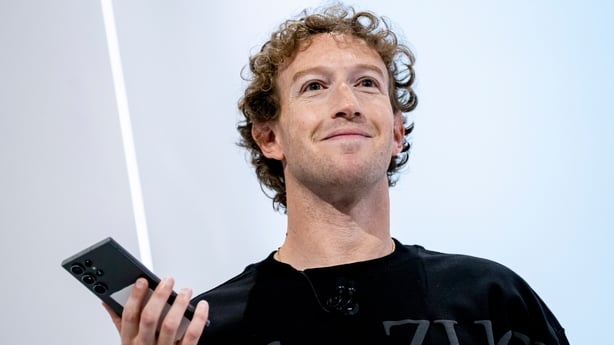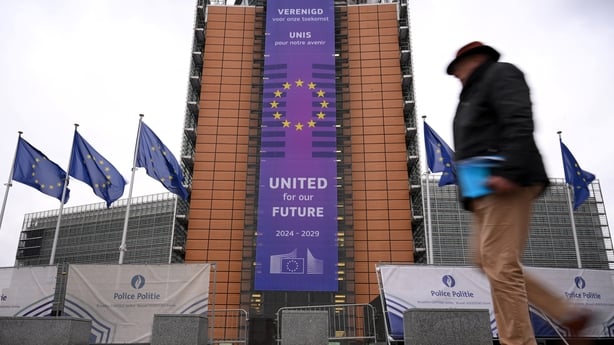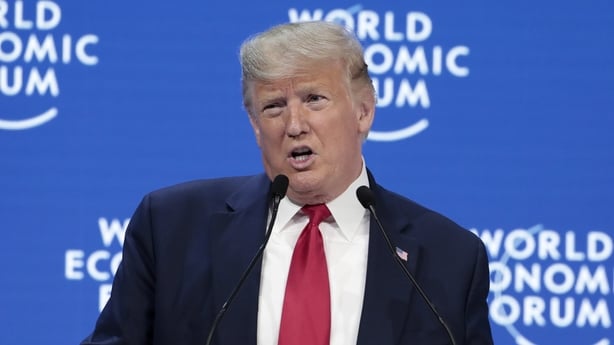When Donald Trump is inaugurated later, sitting nearby will be the biggest names in information technology.
Among the so-called 'tech bros' or 'broligarchy' that have been invited to the swearing-in ceremony are Elon Musk, Mark Zuckerberg, Jeff Bezos, Alphabet CEO Sundar Pichai, Apple boss Tim Cook, and TikTok CEO Shou Zi Chew.
The technology world has embraced Mr Trump, with many CEOs seeing opportunities in his 'America First' anti-regulation policies.
Some companies view the incoming president as an ally in their pushback against what they see as too much regulation and censorship by the European Union.
Because most of the major technology firms have their European headquarters here, Ireland plays a central role in policing these digital giants.
So, if there is to be a showdown between US big tech and the EU, will Ireland be caught in the crossfire?
We need your consent to load this rte-player contentWe use rte-player to manage extra content that can set cookies on your device and collect data about your activity. Please review their details and accept them to load the content.Manage Preferences
The rise of the 'tech bro'
Elon Musk has spent more than $250 million helping Donald Trump get elected.
Mark Zuckerberg and Jeff Bezos donated to his inaugural committee and made trips to Mr Trump's Mar-a-Lago club in Florida for meetings with the president-elect.
As the new US president gets ever closer to the tech bosses, the outgoing leader used his farewell address to criticise them.

Joe Biden warned that an "oligarchy is taking shape in America", saying "a dangerous concentration of power" in the hands of a few individuals threatens US democracy.
In his final Oval Office speech, he referenced a "tech industrial complex" that is bringing an "avalanche of misinformation and disinformation, enabling the abuse of power".
The free press, he added, "is crumbling".
We need your consent to load this rte-player contentWe use rte-player to manage extra content that can set cookies on your device and collect data about your activity. Please review their details and accept them to load the content.Manage Preferences
Mark Zuckerberg
Mark Zuckerberg's Meta is a major employer in Ireland with around 2,000 staff working for the company's Irish operations.
Global announcements made in the US on redundancies, policy shifts and future strategies are always closely watched here amid concerns about what they might mean for the Irish-based workforce.
Earlier this month, Mr Zuckerberg revealed that Meta was scrapping its fact-checking programme in the US and replacing it with a community notes system, similar to the one currently operating on X.
During his video message announcing the move, he also had a pop at EU regulations.
"Europe has an ever-increasing number of laws institutionalising censorship and making it difficult to build anything innovative there," he said.
"We're going to work with President Trump to push back on governments around the world that are going after American companies and pushing to censor more," he added.
It was the latest in a series of moves that are viewed as efforts by Meta to curry favour with the incoming administration.
Prominent conservative Republican Joel Kaplan has been announced as the company's chief global affairs officer, while Dana White, CEO of Ultimate Fighting Championship (UFC) and close friend of Donald Trump, has been elected to the Meta board.
Both Meta and Amazon have recently announced that they are winding down diversity programmes amid conservative opposition to such initiatives.
Ireland - home of the tech watchdogs
Because of Ireland's unique position, it frequently falls on regulators such as Coimisiún na Meán and the Data Protection Commission to investigate the likes of Meta, X, TikTok, LinkedIn and Google.

The next time an Irish watchdog slaps a heavy fine on one of these companies, will it be met with an angry social media post from Donald Trump calling for the decision to be reversed?
Will we see him or members of his team denouncing the ruling in speeches and media interviews?
"Ireland is likely to be a key interlocutor between the European Commission and these companies in the US," said Professor of Political Economy at University College Dublin Aidan Regan.
"So the question then facing Ireland is, will they go with the European Union and strictly enforce EU laws, or will they choose to defend their own economic self-interest and work more closely with these companies, who have clearly signalled that they plan not to follow EU law?" he asked.
The Programme for Government contains a pledge to "invest to make Ireland an EU centre of expertise for digital and data regulation".
There is also a commitment to make Ireland "a regulatory hub for companies operating across the EU Digital Single Market".
These are positive signals from the incoming government according to technology journalist and host of the 'For Tech's Sake' podcast by Elaine Burke.
"Normally, that's not the kinds of words that they put in a Programme for Government," Ms Burke said.
"This is the first time I've seen it explicitly stated that Ireland should be seeking to take a lead as a regulatory power, and I think that's something that we really could do."
"A lot of the big tech companies have a European headquarters in Ireland, and some people think it's because there's been a soft environment for them here, but we still are beholden to EU law and have had to enforce that," she added.
"So it could be that Ireland is seen as the successful mediation point between the US brash approach to tech and the EU's regulatory approach."

"It's not going to be an easy position to take, though, and there will be concerns that if it's a threat to our economy, or if it's a threat to business in Ireland, will that soften the approach in any way?" she asked.
In recent days, the European Commission denied that it was softening its stance on US big tech ahead of Donald Trump's return to the White House.
The Financial Times reported that the EU was reassessing investigations into Apple, Google and Meta, and may consider scaling back the probes.
The commission said that no such review is taking place but added that in upcoming meetings there would be an assessment of the general readiness of the investigations.
Tech job cuts on the way?
Donald Trump wants US companies to move jobs back to the US.
If the big tech firms were to decide to downsize their international operations and relocate roles to the US, it would have a major impact on Ireland.
However, the likes of Apple and Meta have set up Irish bases as it gives them access to the lucrative EU market and they will need to maintain a major presence on this side of the Atlantic.
"Most of the activities in these companies and their subsidiaries in Ireland are sales," said Prof Aidan Regan.
"But are the global sales of these media platforms likely to be negatively affected by them working more closely with Trump, and will they lose advertisers?"
"I think it's probably fair to say that the employment in these firms is more volatile than it ever has been," he added.
Journalist Elaine Burke said that it would be very hard to run a multinational tech operation and not have offices, operational bases and data centres outside of the US.
"That's not to say we are completely insulated from any of these disruptions," Ms Burke said.
"Meta has said that they're going to cut 5% of their workforce, and chances are that of the 2,000 employees here in Ireland, some of them will be caught up in that cut."
"I don't know if we're going to see in terms of jobs, the kind of disruption we saw a couple of years ago, but I do think that sometimes when one company decides to scale back and it is seen as a leader in a space, and it does that successfully, other companies can get ideas," she added.
As Donald Trump takes his oath later, he will be flanked by the tech billionaires that helped put him in office.
They now have his ear when it comes to regulation and censorship.
Every country around the world will be watching and waiting to see what the Trump presidency will mean for them.
When it comes to the technology space, Ireland operates in a unique position between the US and the rest of Europe in both a geographical and regulatory sense.
Hard choices may have to be made if upholding EU law brings us into direct conflict with the country and companies that Ireland's finances have become so reliant on.







